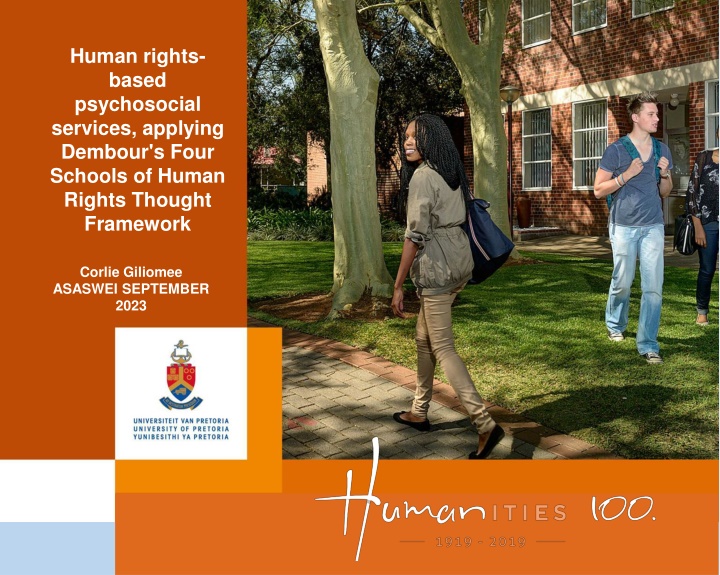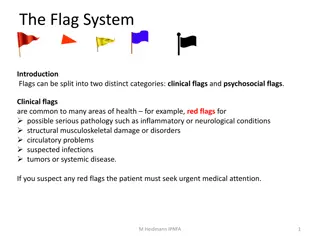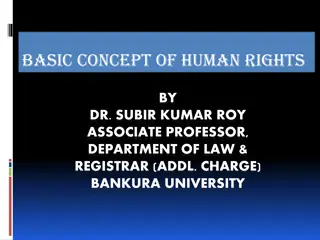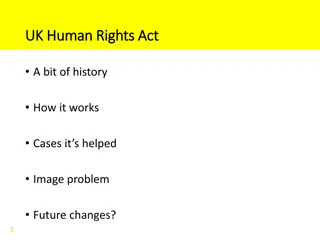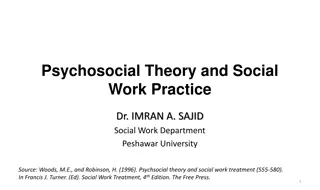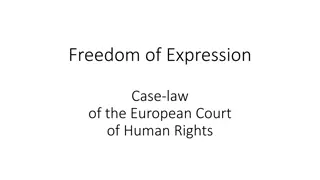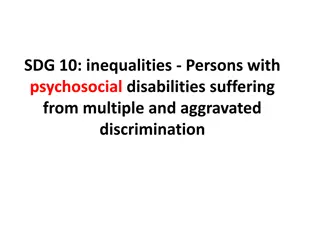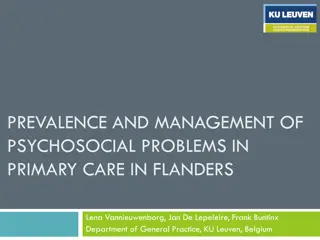Human Rights-Based Psychosocial Services and Dembour's Framework
Human rights-based social work practice involves upholding principles such as human dignity, nondiscrimination, participation, transparency, and accountability. It is rooted in advocacy, activism, and the application of Dembour's Four Schools of Human Rights Thought to offer psychosocial support after disasters and traumatic events. These principles aim to promote safety, efficacy, social connectedness, and hope in individuals and communities experiencing shocks caused by natural or human-made disasters.
Download Presentation

Please find below an Image/Link to download the presentation.
The content on the website is provided AS IS for your information and personal use only. It may not be sold, licensed, or shared on other websites without obtaining consent from the author.If you encounter any issues during the download, it is possible that the publisher has removed the file from their server.
You are allowed to download the files provided on this website for personal or commercial use, subject to the condition that they are used lawfully. All files are the property of their respective owners.
The content on the website is provided AS IS for your information and personal use only. It may not be sold, licensed, or shared on other websites without obtaining consent from the author.
E N D
Presentation Transcript
Human rights- based psychosocial services, applying Dembour's Four Schools of Human Rights Thought Framework Corlie Giliomee ASASWEI SEPTEMBER 2023
Content Rights-based social worker practice Disasters, traumas and shocks Psychosocial support after disasters or other traumatic events Dembour s four schools of human rights thought Rights to uphold after disasters occurred Summary FACULTY OF HUMANITIES
What is human rights-based social work practice? Rights-based social worker practice is rooted in the human rights principles of: human dignity nondiscrimination participation transparency and accountability (Androff, 2016:35) It is also political and requires advocacy and activism (McPherson, 2020:62). FACULTY OF HUMANITIES
Disasters, traumas and other shocks that people experience Disasters may be caused by nature: including earthquakes, floods, wildfires, hurricanes, or tornadoes. Disasters may be human-made, caused by people through mishap or neglect, such as a work accident or an apartment fire, or by deliberate intention, as with terrorism. FACULTY OF HUMANITIES
Psychosocial support after disasters or other traumatic events Should promote these principles a sense of safety calming self- and community efficacy social connectedness hope FACULTY OF HUMANITIES
What is Dembours Four Schools of Human Rights Thought about? Because of the vastness of the human rights field, combined with the multitude of theories and schools of thought on human rights, ranging from earlier centuries to the contemporary age, Dembour (2012:137) endeavoured to provide an overview of the conceptual field of human rights, which she coined the four schools of human rights thought . FACULTY OF HUMANITIES
What is Dembours Four Schools of Human Rights Thought about? The four schools of thought include the following Natural school Deliberative school Protest school Discourse school FACULTY OF HUMANITIES
Schools of thought (orientation) Natural school Deliberative school (HR secularism/ new orthodoxy) Agreed upon Fought for Protest school (HR dissidence) Discourse school (HR nihilism) (HR old orthodoxy) A given Talked about Are conceived, in short, as: Consist in: Entitlements Principles Claims/aspi- Whatever (probably rations you put into negative at them their core) Every single Running the First and Should be, Are for: human being polity fairly foremost, but are not, those who for those FACULTY OF HUMANITIES suffer who suffer
Schools of thought (orientation) Natural school Deliberative school (HR secularism/new orthodoxy) Protest school (HR dissidence) Discourse school (HR nihilism) (HR old orthodoxy) Definitely Yes law is Should be, HR law exists Can be embodied in law? this is the aim their typical if but law too but does not not only often betrays embody mode of the HR idea anything existence grand Yes Yes No No See HR law since 1948 as definite progress FACULTY OF HUMANITIES
Schools of thought (orientation) Natural school Deliberative school (HR secularism/new orthodoxy) Protest school (HR dissidence) Discourse school (HR nihilism) (HR old orthodoxy) Nature / God A consensus A tradition of Language Are based on: / Universe / as to how the social Reason (with polity should struggles (but legal be run (with with a consensus reason in the yearning for acting as a background) the fall-back for transcenden- many) tal) FACULTY OF HUMANITIES
Schools of thought (orientation) Natural school Deliberative school (HR secularism/new orthodoxy) Yes, through Protest school (HR dissidence) Discourse school (HR nihilism) (HR old orthodoxy) Yes, through No, they No, Are realisable? individual political require unsurprisingly enjoyment organisation perpetual they are a (and good (and good struggle (and failure substantive procedural implementing laws) laws) laws risk being an abject deformation of their ideal) FACULTY OF HUMANITIES
Schools of thought (orientation) Natural school Deliberative school (HR secularism/new orthodoxy) Protest school (HR dissidence) Discourse school (HR nihilism) (HR old orthodoxy) Yes, definitely, Potentially, if At source, yes, No, they're Are universal? they are part of the consensus if only because supposed the structure of broadens suffering is universality is a the universe universal pretence (even if they get translated in practice in slightly different forms) FACULTY OF HUMANITIES
Rights which should be upheld when planning for, responding to or recovering from a disaster (Ferris, 2012) FACULTY OF HUMANITIES
Rights that direct attention to lifesaving measures, such as evacuations and protection against the secondary impacts of natural disasters. Protect rights related to the provision of food, health, shelter and education in the aftermath of a disaster and do so in ways that uphold the rights of affected people. Rights related to housing, land and property; restoration of livelihoods; and secondary and higher education Rights related to documentation, freedom of movement, and civil and political rights need to be upheld, particularly as time goes on. FACULTY OF HUMANITIES
Natural school Deliberative school (HR secularism/new orthodoxy) Protest school (HR dissidence) Discourse school (HR nihilism) Category of rights (HR old orthodoxy) Rights that Which policies Campaigning Discourse that People s rights direct attention to lifesaving and official for more emphasises to lifesaving measures must documents efficient ways protection and measures, such be viewed as a exist guiding to evacuate lifesaving as evacuations given lifesaving people and measures for and protection measures following up on people s rights, against the during their rights to e.g. with local secondary disasters, e.g. protection government, impacts of natural The Disaster NGOs, disasters. Management communities Act 57 of 2002 FACULTY OF HUMANITIES
Natural school Deliberative school (HR secularism/new orthodoxy) Protest school (HR dissidence) Discourse school (HR nihilism) Category of rights (HR old orthodoxy) Protect rights related to the Second- Policies on Monitor access Is the provision generation supporting disaster victims of food, health, provision of rights: Social, disaster victims have to food, shelter and food, health, economic and health care, education after shelter and cultural rights shelter and a disaster a education in the education. Use human rights aftermath of a platforms such issue or just disaster and do as social media the so in ways that uphold the to raise government rights of concern if it and affected people. does not communities happen way of caring? FACULTY OF HUMANITIES
Natural school Deliberative school (HR secularism/new orthodoxy) Protest school (HR dissidence) Discourse school (HR nihilism) Category of rights (HR old orthodoxy) Policies on Action and Discussion to Rights related to housing, land and property; restoration of livelihoods; and secondary and higher education It s a given that people should land, housing, protest groups create have access to and stimulating awareness that when people s these third the rights to land, this is actually generation HR development of property and a right s issue (Collective sustainable restoration of rights) livelihoods and livelihoods etc. enterprises. are not being addressed. FACULTY OF HUMANITIES
Natural school Deliberative school (HR secularism/new orthodoxy) Protest school (HR dissidence) Discourse school (HR nihilism) Category of rights (HR old orthodoxy) Part of first Bill of rights Monitoring the Consultation Rights related to documenta- tion, freedom of movement, and civil and political rights need to be upheld, particularly as time goes on. generation development of with multiple Disaster rights policies and stakeholders Management Freedoms campaigning platform for the Act, 2002 (Act upheld by for policy development of No. 57 of 2002) government changes draft legislation FACULTY OF HUMANITIES
In summary Four schools Natural, deliberative, protest, discourse HR based SW practice human dignity, nondiscrimination, participation, transparency, accountability Psychosocial support after disasters a sense of safety, calming, self- and community efficacy, social connectedness, hope FACULTY OF HUMANITIES
REFERENCES Androff, D. 2016. Practicing rights: Human rights-based based approaches to social work practice. London and New York, NY: Routledge. Dembour, M. 2012. What are human rights? In Cushman, C. (ed.), Handbook of human rights. New York, NY: Routledge. Ferris, E. 2012. A human rights-based approach and district disaster management plans. Available at: https://www.brookings.edu/articles/a-human-rights-based-approach-and- district-disaster-management-plans/ (Accessed 2023-09-03). International Society for Traumatic Stress Studies. [Sa]. Mass disasters, trauma and loss. Available at: https://istss.org/ISTSS_Main/media/Documents/ISTSS_MassDisaterTraumaandLoss_En glish_FNL.pdf (Accessed 2023-09-02). McPherson, J. 2020. now is the time for a rights-based approach to social work practice. Journal of Human Rights and Social Work, 5 61 63) https://doi.org/10.1007/s41134- 020-00125-1 United Nations. 1984. Universal Declaration of Human Rights (adopted on 10 December 1984). Available at: http://www.un.org/en/documents/udhr/ (Accessed 2018/04/26). FACULTY OF HUMANITIES
THANK YOU corlie.giliomee@up.ac.za FACULTY OF HUMANITIES
